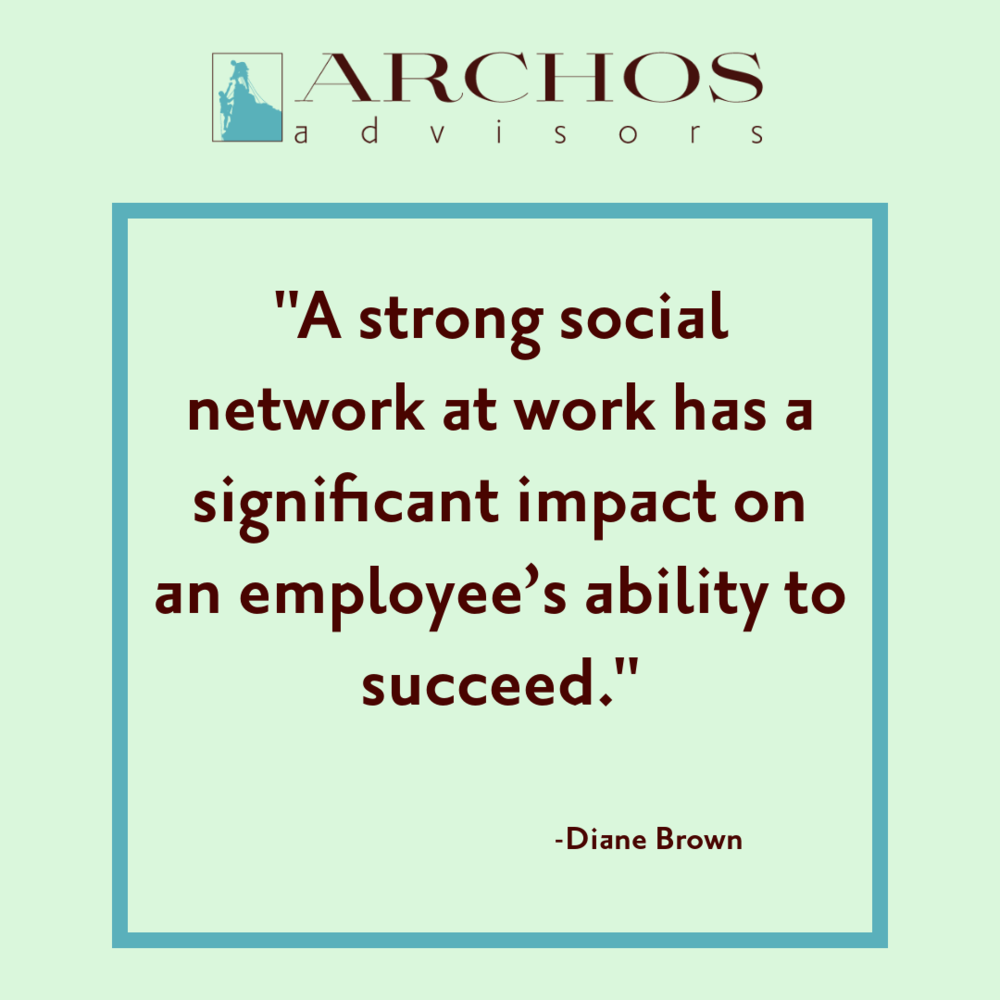
When we think about everything we have to do at work, too often we think about the tangible tasks – the responsibilities, the deliverables, the to-do lists, and the activities that have to be executed. We measure our results and accomplishments by the details of our job descriptions. What is not as visible are the intangibles that impact how we get work done – our social network and the human connections that contribute to our results.
In our work with organizations, it is not uncommon for us to get asked about topics such as onboarding, promotions, and ways a company can set its employees up for success. The resources we often see are lists and education surrounding the “knowledge” or “skills” one needs to possess to be successful, and those are important. However, setting up the individual with the social network required for them to be effective is just as important. A strong social network at work has a significant impact on an employee’s ability to succeed as well as an employer’s ability to retain that individual. This is why organizations should proactively help team members foster key connections.
Proactive companies prioritize relationships both during the onboarding process and as the individual advances. These relationships extend beyond casual lunches or happy hours to intentional introductions and conversations with selected team members around key work areas. This type of focus has many benefits, including:
- Perspective – Having different touchpoints in the organization can broaden one’s perspective on the work, how it fits with the mission, the important elements, and things that impact perception of quality.
- Knowledge sharing – Whether it is success stories, technical knowledge, or political/navigational knowledge, intentional connections can help promote organizational knowledge sharing for a new employee or upon a new promotion.
- Getting things done inside and outside the organization – It is important to have connections that can answer questions, address obstacles, remove roadblocks, share advice, provide insights or ideas, and connect individuals to resources.
- Affiliation – When we join an organization, we want to feel that we belong or that we are part of it. The stronger our social network, the stronger the affiliation or sense of belonging.
- Engagement and resiliency – In tough or challenging times and during periods of change, strong and trusted connections provide support and encouragement. Knowing a “go to” or confidante who can empathize or sympathize can help employees persist and persevere.
To be more proactive in fostering social networks for your employees the first step is to examine what is needed. As you look at the tangible results expected at each level, what are the relationships that can help accomplish these?

For example, if it is expected that an employee deliver an exceptional customer or client experience, who should they know that can provide them with perspective beyond what is described on paper? Is it an exemplary client service manager or another team member to “show them the ropes”? Or Is it connecting them with someone who can help them triage potential questions, customer issues, or complaints? Maybe it’s all three.
If the expectation is business development, the relational map might include connecting them with people in other organizations at the same level, introducing them to a connection within their industry or niche, or identifying someone who serves as a role model. The social network you are trying to help them jump start depends on the relational expectations and the “human” resources that could be most beneficial in helping them execute effectively.
By looking at each results area, you can identify relationships that will be important for the individual and/or team and add those to the onboarding experience. For newly promoted individuals, ask yourself if there are new relationships that could be important to start developing. If so, begin to facilitate those introductions, helping those involved understand how or why the connection is important.
As you work with individuals in your firm to help them grow or assimilate into a role, don’t just look at the “work”. Look at the partnerships, teaming, and conversations it will take to get the work done. Then dial up the relational aspects of your onboarding or development process. This focus on tasks AND relationships will help your team members build a stronger foundation and deliver better results.
